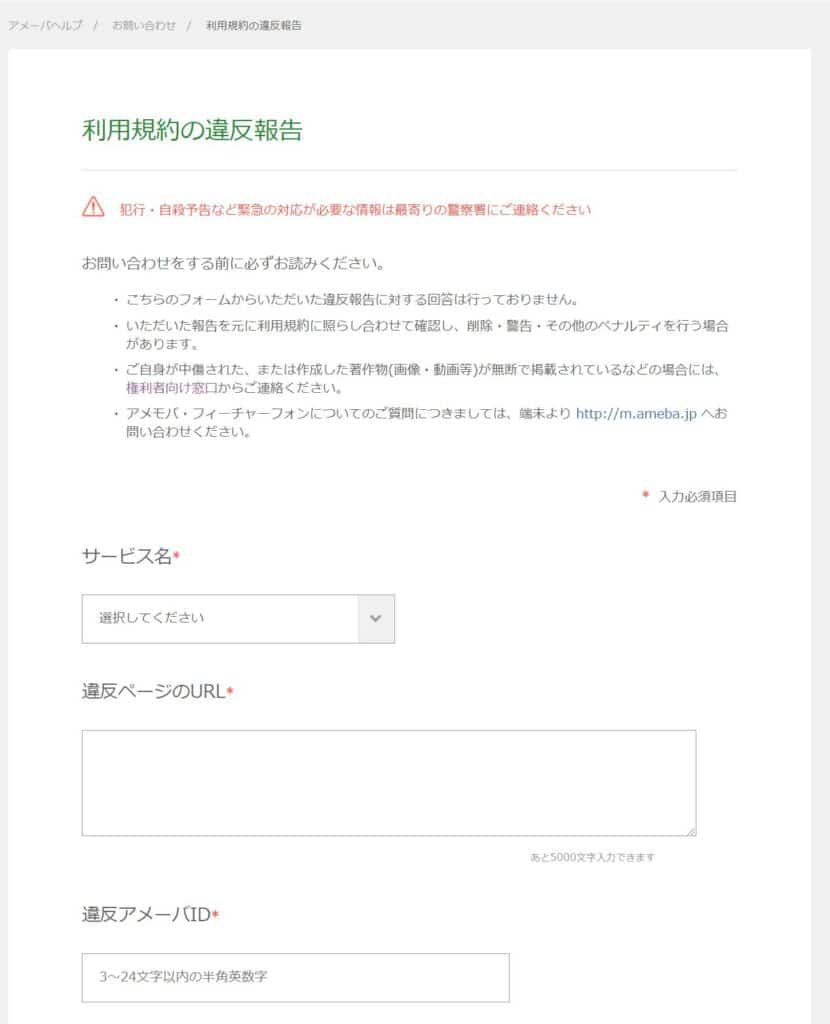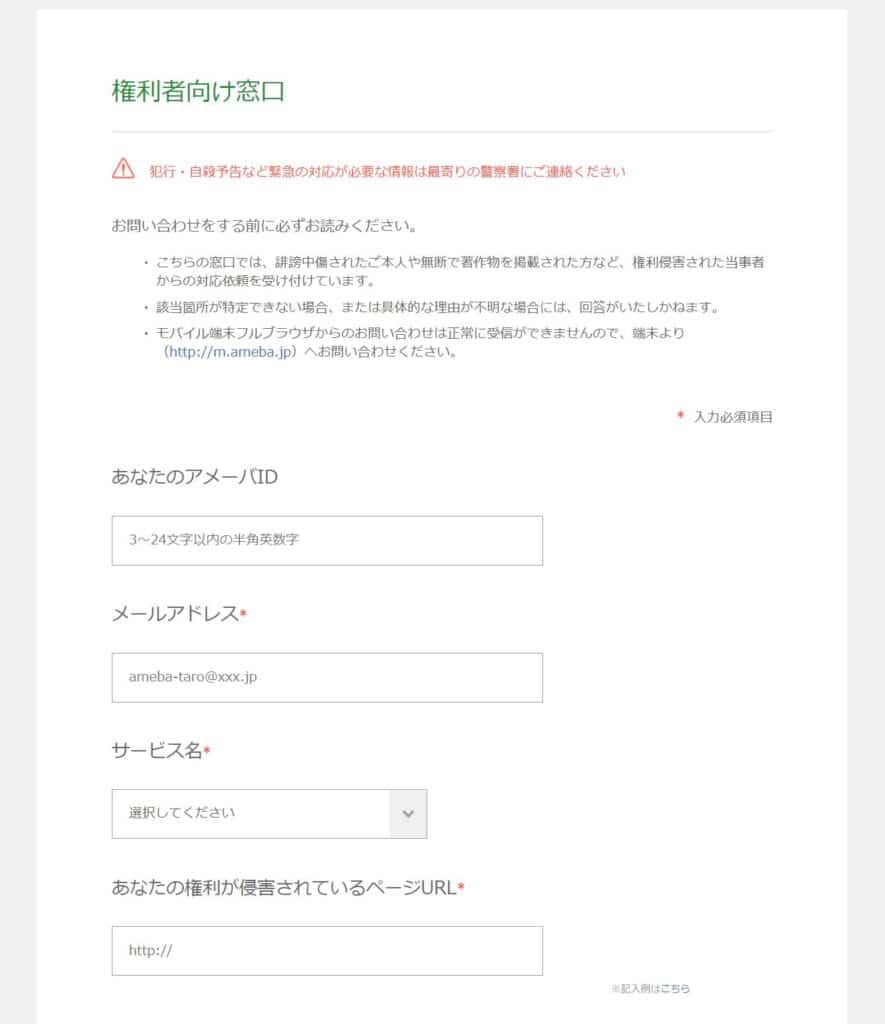Comprehensive Explanation on How to Remove Defamatory Articles from Ameba Blog (Ameblo)

Ameba Blog (hereinafter referred to as “Ameblo”) is one of the many blog services widely used in Japan. On these blogs, you can read about various experiences with shops and services.
However, there are instances where negative content is posted, and there is a risk that users who see this may leave. This could potentially have a negative impact on sales.
So, is it possible to take measures such as deleting such negative posts?
In this article, we will explain how to request the removal of defamatory articles, including cases where it may be advisable to consult with a lawyer.
What is Ameba Blog?

Ameba Blog is a platform where anyone can create a blog for free, and you can read blogs from a wide range of people, from celebrities to the general public.
Furthermore, you can read real-life experiences of services such as restaurants and beauty salons that bloggers have used.
Therefore, if negative articles are posted, users who are searching for reviews of restaurants and beauty salons on Ameba Blog or Google may see these reviews and decide to avoid making reservations.
What are the Negative Posts on Ameblo?

When you search for the name of a restaurant or beauty salon on Ameblo, you can read the experiences of people who have actually dined at the restaurant or received treatment at the salon.
While it is beneficial for users to read these real experiences, there are cases where negative posts, such as slander, are posted.
What kind of negative posts are posted on Ameblo? Below are examples of negative content posted on Ameblo.
Content Leading to a Negative Image
Posts like “The staff at Restaurant XX were so unpleasant. They live in XX Hills and are so arrogant.”
Such posts can lead to a negative image of the restaurant’s service, which could potentially harm the restaurant’s business.
Content Due to Misunderstanding
There are cases where posts like “The solicitation at XX beauty salon was forceful, and I was forced to sign a contract” are posted.
If true, such posts can be useful information for users considering visiting the beauty salon.
However, there may be a misunderstanding between the poster and the staff, where the poster perceives the solicitation as forceful even though it was not.
In such cases, if a post stating “The solicitation at XX beauty salon was forceful, and I was forced to sign a contract” is made, the beauty salon may suffer losses such as a decrease in the number of visitors.
Other Groundless Slanderous Posts and Rumor Damage Posts
On Ameblo, there are cases where slanderous articles and rumor damage articles with no basis against the staff of service industries such as restaurants and beauty salons, and other ordinary people, are posted beyond the scope of general blogs.
Such posts should be deleted, just like slanderous posts and rumor damage posts on anonymous bulletin boards like 5chan.
How to Request a Post Deletion from the Author

If a negative article is posted on Ameba Blog, you can directly request the author to delete it by registering as a member on Ameba.
The method of registering as a member of Ameba is as follows:
- Access the Ameba member registration page
- Enter your email address, Ameba ID, password, date of birth, and gender, and send the registration email
- You will receive an email confirming your provisional registration
- Click on the URL in the email to complete the registration
Once you have completed the registration process with Ameba, you can use the message and comment functions to request the author to delete the post.
At that time, it would be helpful to specifically write which part of the article you believe is infringing on your rights, what kind of damage has occurred (or could potentially occur), etc.
Also, try to remain calm and write politely, rather than becoming emotional.
Some authors may have set their accounts not to receive messages or comments, in which case you will need to consider other methods such as requesting Ameba to delete the post.
If you have requested the author to delete the post but they have not done so, you will need to request Ameba to delete the post.
If the post is still not deleted, you will need to request deletion through the courts. These methods will be explained below.
How to Request Removal for Violation of Ameba Terms of Use
If you believe a negative article violates the Ameba Terms of Use[ja], you can report the violation through the violation report function.
Furthermore, if the article infringes on your rights, you can request removal through the rights holder’s contact point.
By clicking the “Contact Ameba” button on the Ameba Help page, and then clicking the “Violation Report” button, the following screen will appear. You can select the content of the violation and write a specific reason before sending it.

If you are the party involved, you can also request removal through the rights holder’s contact point.
By clicking the “Contact Ameba” button at the bottom of the Ameba Help page, and then clicking the “Rights Holder’s Contact Point” button, the following screen will appear.
You can fill out this form with the rights that have been infringed and the desired response, and then send it.

- According to Article 13 of the Ameba Terms of Use, if CyberAgent, Inc. determines that the following items have been violated,
- Content sent can be deleted
- Use of all or part of the service can be suspended
- Membership can be terminated
- Other measures deemed appropriate can be taken
as stipulated.
<Excerpt from Article 13, Paragraph 4 of the Ameba Terms of Use>
(1) Lacking in good sense or dignity
(omitted)
(2) Defaming other members, users, our company, or other third parties, damaging their honor, infringing on their rights
① Defaming or insulting other members, users, our company, or other third parties, or damaging their honor or credit, sending expressions or content
② Sending expressions or content that lead to discrimination based on race, ethnicity, gender, creed, social status, residence, physical personalityistics, medical history, education, property, etc.
③ Sending personal information without the person’s consent (however, information about celebrities and others that is generally public is excluded)
④ Infringing or potentially infringing on the intellectual property rights of third parties, such as trademark rights, copyrights, moral rights of authors, portrait rights, and publicity rights, sending expressions or content
⑤ Infringing or potentially infringing on the property, privacy, and other personal rights of third parties, sending expressions or content
(3) Violating social ethics or laws
(omitted)
(4) Commercial activities without our consent
(omitted)
(5) The following actions aimed at manipulating the ranking of search engine results, whether using software tools or not
① Creating multiple accounts or posting the same or similar articles multiple times
② Using the accounts created in the previous item to post articles and guide (link) to other websites, other accounts, other posted articles, etc.(6) Others
Source: Ameba Terms of Use[ja]
(omitted)
For example, the content “The staff at Restaurant ○○ were so unpleasant. They seem to live in △△ Hills and are so arrogant” could be considered a violation of Article 13, Paragraph 4, Item (2) ⑤ of the Ameba Terms of Use, “Infringing or potentially infringing on the property, privacy, and other personal rights of third parties, sending expressions or content,” and a removal request could be made.
Examples of Deletion Requests Based on Illegality

In the Case of Defamation (Infringement of Honor)
First, we need to consider defamation (infringement of honor) in relation to Article 13, Paragraph 2, Item (2) of the Ameba Terms of Use, which states, “Anything that defames other members, users, our company, or any other third party, or infringes upon their rights.”
Defamation is the act of presenting facts that could potentially lower a person’s social reputation to an unspecified number of people.
The requirements for defamation are as follows:
- Publicly
- Presenting facts
- Defaming a person’s honor
If a post is made stating, “The solicitation of □□ Esthetic Salon was aggressive, and I was forced into a contract,” then:
- The statement in the blog that “the solicitation was aggressive, and I was forced into a contract” is a presentation of specific facts that can be recognized by an unspecified or large number of people,
- Because the solicitation of esthetic salons is subject to certain legal regulations, being perceived as an esthetic salon that conducts aggressive solicitation can lower the social reputation of our esthetic salon,
- Our esthetic salon does not conduct aggressive solicitation.
These are the arguments that would be made. However, even if the above requirements for defamation are met, defamation will not be established if the following conditions are met:
- There is public interest
- There is public benefit
- It is true or the truthfulness is recognized
Not only the above example, but also other slanderous articles and rumor damage articles may be cases that should be considered for defamation.
However, deletion negotiations based on such claims and legal arguments may be difficult if you are not familiar with the law.
By consulting with a lawyer with extensive know-how, it may be possible to smoothly delete the content. The requirements for defamation are explained in detail in the following article.
Related article: What are the conditions for suing for defamation? Explaining the requirements and the average compensation for damages[ja]
In the Case of Insult (Infringement of Honor Emotion)
Honor emotion refers to the consciousness and evaluation of one’s own personal value as perceived by oneself.
While the honor in defamation refers to “social (external) evaluation,” the honor in insult (infringement of honor emotion) is a matter of “subjective honor.”
Since honor emotion is ultimately subjective, if it is unconditionally protected by law, the scope of protection would expand without limit.
Therefore, the Supreme Court has limited the scope of legal protection to “insulting acts beyond the limits permitted by social norms” (Supreme Court decision of April 13, 2010 (Heisei 22) (2010), Minshu Vol. 64, No. 3, p. 758).
Furthermore, since it is a subjective emotion, its infringement can only be recognized for natural persons, and corporations cannot claim insult.
Removal through Provisional Disposition Procedure

If a post is not removed even after reporting a violation of the terms of use or applying for removal through the rights holder’s window, you will need to request removal through the court.
Articles on Ameblo can be removed through litigation, but they can also be removed through a procedure called provisional disposition.
Litigation takes about 3 to 12 months to reach a verdict, and in some cases, it can take several years.
Provisional disposition, on the other hand, often takes about 2-3 months from consultation to removal if you consult with a lawyer who is familiar with reputational damage. The provisional disposition is carried out in the following flow.
Application for provisional disposition → Bilateral examination (procedure similar to oral argument) → Payment of security deposit → Issuance of provisional disposition order → Execution
When carrying out a provisional disposition, not only legal claims but also evidence to prove those claims is necessary. For example, in the case of “The solicitation of □□ Esthetic was forceful, and I was forced to contract,” you would submit as evidence:
- The contract with the customer in question
- The pre-contract explanation document for the customer in question
- The manual for esthetic solicitation
And argue that “Our esthetic salon does not forcefully solicit customers, but contracts with them after providing a polite and clear explanation.”
However, it can be difficult to make such claims on your own without consulting a lawyer. For more details on the removal provisional disposition, please refer to the article below.
Related article: What is the “Removal Provisional Disposition” Important in Defamation Measures[ja]
Identifying the Poster through Provisional Disposition

If there are numerous instances of harassment, groundless slanderous articles, or damaging rumors being continuously posted, you can request a lawyer to make a sender information disclosure request.
A sender information disclosure request is a procedure based on Article 4, Paragraph 1 of the Japanese Provider Liability Limitation Act. Through this procedure, you can request the disclosure of information such as the IP address, name, and address of the poster of slanderous or damaging rumors.
Ameba Blog is a blogging service that allows you to create a blog and post articles for free once you register an Ameba ID.
Therefore, there may be cases where individuals who harbor resentment towards a company or person post groundless rumors or slanderous articles.
In such cases, if the poster’s IP address and other information can be identified, it may be possible to identify the poster. The process for identifying the sender is as follows:
- Make an information disclosure request to the content service provider
- Apply for a provisional disposition order for sender information disclosure
- Identify the transit provider
- Apply for a provisional disposition order to prohibit the deletion of sender information to the transit provider
- Initiate a lawsuit for a sender information disclosure request
- Identify the sender (address, name, etc.) based on the court’s judgment
After going through the above procedures, if the poster of malicious articles such as rumors is identified, you can claim damages from the poster for the attorney fees and consolation money required for identification.
One thing to note here is the log retention period of the provider.
If the retention period has passed, you will not be able to obtain the sender’s personal information, and as a result, the disclosure request will fail.
Since the log retention period of providers is often three to six months, it is desirable to start the disclosure request with plenty of time to spare.
For more details on sender information disclosure requests, please refer to the article below.
Related article: What is a sender information disclosure request? A lawyer explains the method and points to note[ja]
Process After Engaging a Lawyer

When you engage a lawyer, the following process is undertaken to address the damage you have suffered.
Request for Deletion
Firstly, it is necessary to delete the defamatory article to avoid reputational damage.
There are two methods: directly requesting the poster or site administrator to delete the article, or applying to the court for a provisional disposition to delete the post, as mentioned above.
Request for Disclosure of Sender Information
If the poster cannot be identified, it is necessary to identify them through a request for disclosure of sender information, as mentioned above.
If the poster can be identified, you can demand compensation for the damage caused by the defamation from the poster.
Claim for Damages
By sending a certified mail or through litigation, you can make a claim for damages against the poster.
You can leave the creation of certified mail, litigation documents, and handling of court dates to the lawyer.
Conclusion: Consult a Lawyer for Legal Deletion
Ameba Blog is a very convenient service where anyone can create a blog and view many others. However, there may be instances where defamatory articles and the like are posted due to misunderstandings or harassment.
In response to such malicious posts, it is advisable to report violations of the terms of service and apply for deletion through the rights holder’s window. If the post is not deleted, it may be better to request deletion through the court or proceed with identifying the poster.
Legal claims such as defamation are often difficult to pursue alone without the assistance of a lawyer.
Furthermore, as time passes, it may become impossible to identify the poster. If you are troubled by defamatory articles and the like posted on Ameba Blog, it is important to consult a lawyer as soon as possible.
Introduction to Our Firm’s Measures
Monolith Law Office is a legal office with high expertise in both IT, particularly the Internet, and law. In recent years, overlooking information related to reputational damage and slander spread on the Internet can lead to serious harm. Our firm provides solutions for managing reputational damage and online crises. Details are provided in the article below.
Category: Internet





















